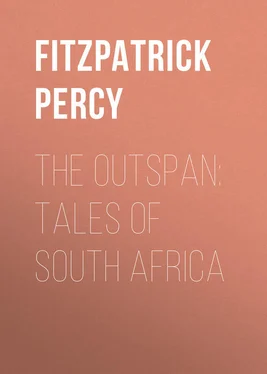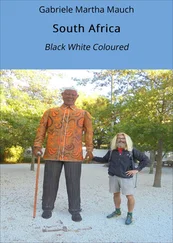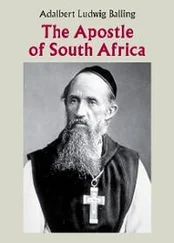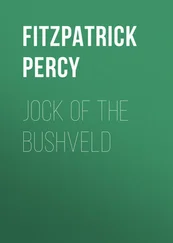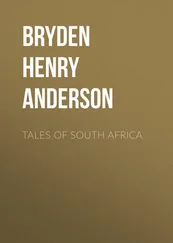Percy Fitzpatrick - The Outspan - Tales of South Africa
Здесь есть возможность читать онлайн «Percy Fitzpatrick - The Outspan - Tales of South Africa» — ознакомительный отрывок электронной книги совершенно бесплатно, а после прочтения отрывка купить полную версию. В некоторых случаях можно слушать аудио, скачать через торрент в формате fb2 и присутствует краткое содержание. Жанр: foreign_antique, foreign_prose, short_story, на английском языке. Описание произведения, (предисловие) а так же отзывы посетителей доступны на портале библиотеки ЛибКат.
- Название:The Outspan: Tales of South Africa
- Автор:
- Жанр:
- Год:неизвестен
- ISBN:нет данных
- Рейтинг книги:3 / 5. Голосов: 1
-
Избранное:Добавить в избранное
- Отзывы:
-
Ваша оценка:
- 60
- 1
- 2
- 3
- 4
- 5
The Outspan: Tales of South Africa: краткое содержание, описание и аннотация
Предлагаем к чтению аннотацию, описание, краткое содержание или предисловие (зависит от того, что написал сам автор книги «The Outspan: Tales of South Africa»). Если вы не нашли необходимую информацию о книге — напишите в комментариях, мы постараемся отыскать её.
The Outspan: Tales of South Africa — читать онлайн ознакомительный отрывок
Ниже представлен текст книги, разбитый по страницам. Система сохранения места последней прочитанной страницы, позволяет с удобством читать онлайн бесплатно книгу «The Outspan: Tales of South Africa», без необходимости каждый раз заново искать на чём Вы остановились. Поставьте закладку, и сможете в любой момент перейти на страницу, на которой закончили чтение.
Интервал:
Закладка:
I frankly confessed that I simply had not thought of it, and that was all. As, however, Gowan continued growling about “beastly shame” and “poor devil of a greenhorn,” etc, Key answered dryly.
“Waal, I did think of it; but, first place, they ain’t my waggons – ”
Gowan grunted out, “Dam rot!”
“And second place,” continued Key placidly, “considerin’ the kind o’ cargo you’ve got aboard, and where it’s going to, I didn’t reckon you wanted any passengers!”
“I don’t want passengers,” said Gowan gloomily; “but any damned fool knows that that fellow’ll never see food or blankets or ‘boy’ again on the face of God’s earth. Kaffir carriers don’t forget things at outspans. No, not any that I’ve seen, and I’ve seen a good few.”
Old Gowan took up the grass stem again, and chewed and tugged at it, and made occasional kicks at passing bushes, by way of showing a general and emphatic disapproval. No one said anything; it was Gowan’s way to growl at everything, and nobody ever took much notice. He was the most good-natured, kindly old growler that ever lived. He growled as some sturdy old dogs do when you pat them – they like it.
In this particular case, of course, he had reason. It is not that we were inhospitable or unfeeling, but years of roughing it had, I suppose, dulled our impressions of the first night alone in the veld, and we had not seen it as Gowan did. Life of the sort we led, no doubt, develops the sterling good qualities of one’s nature, but quick sympathy and its kindred delicate traits are rather growths of refinement and quiet, and it betrayed no real want of feeling that we had not taken Gowan’s view.
There could be no doubt, of course, that the Kaffir boy had bolted with the blankets and food, for we had noticed that the young German had nothing left when we saw him but that yellow portmanteau, and our knowledge of the Delagoa Bay “boy” forbade acceptance of the theory that he had gone empty-handed.
We rumbled heavily along for a bit, and after a while Gowan resumed, in a tone of deeper grumbling and more surly dissatisfaction than before:
“Like as not the silly young fool ’ll lose himself looking for water, and die in the Bush, like that one Joe Roberts brought up last season. Why, I remember when – ”
“Grave o’ the Prophet!” exclaimed Robbie, starting up in mock alarm; “he’s going to tell us that dismal yarn about the parson chap who hunted beetles, and was found after a week’s search with two of his most valuable specimens feeding on his eyes. Skip, sonnie, skip! and fetch up your German friend ’fore the old man gets under way.”
Key dropped off the buck-rails, as the drivers shouted their “Aanhouws” to the cattle to give them a breather, kicked his legs loose a bit, dusted down his trousers quietly, and, smiling good-humouredly at Gowan, “guessed it was better business to hump that gripsack a mile or two than listen to old Yokeskey’s prayers.” That was his irreverent way of alluding to Gowan’s calling of transport-rider – a yokeskey being part of the trek gear. Key and I set out together at a brisk pace, well knowing how poor was our chance of catching up to the waggons again before the midnight outspan.
Key, who was always tickled by Gowan’s growling tones, remarked after we had walked for some minutes:
“Sling hell like a nigger parson, you know, can the old ’un, but soft and harmless as a woman.”
After half an hour’s brisk walking, we caught the unsteady flicker of a fire through the straggling thorns, and we found our friend sitting tailorwise before it, making vigorous but futile attempts to wisp aside the smoke that would go his way. His look of mild curiosity at the sound of our voices wakened up into welcome when he recognised us, and he at once became interested in the reason of our return.
“You haf lose something – not? I, too, will look for you,” he said, jumping up eagerly; but we reassured him on that point, and inquired in turn whether his “boy” had returned, and cross-questioned him as to the when and wherefore of his leaving.
The Kaffir-bearer, he said, had left him that morning during the after-breakfast trek.
“Ten hours gone, by Jimmie!” muttered the Judge.
“And you have waited here since then?” I asked.
“Oh yes, yes! I read to learn de English. It is – ”
“Had any scoff?”
“Please?”
“Had any grub – anything to eat or drink?” explained Key, illustrating his meaning by graphic touches on mouth and belt.
“No, no; I am not hunger. Also it is good that I eat not. It make me use for the prospect.”
Key smiled gently, and said, with a quaint judicial air:
“Waal, I don’t know as that’s quite necessary; but ef you kin stick it out till that nigger o’ yours comes back, I guess you’ll do for most any camp you’ll strike in this country. Say! Has he got the blankets? Yes! And the grub? So! An’ – er – mebbe you didn’t give him money as well?”
“I haf give him one pound to pay the passport, which he forgot. He say policeman will take him if he shows not the ticket. But he will come bring to me the change. He is ein goot boy, and he speaken English feul goot; but perhaps something can happen, and that policeman haf take him, I think.”
Even in a new-comer such credulity was a revelation. I could not help smiling, but the Judge’s clear-cut, impassive features never changed; only, at the mention of the “boy’s” lingual accomplishments, he winked solemnly at me.
The Judge brought matters to a practical issue by telling our friend that he “had much better wait at our waggons for the good boy that speaks English so well.”
“It ain’t,” said Key, “es if he couldn’t find you. A Kaffir kin find you most anywhere if he wants to – ’specially them English-speakin’ ones,” he added, with a twinkle in his eyes.
Key did not wait for any reply, but turned the “yaller gripsack” over and looked at the name, “Adolf Soltké,” painted in big white letters.
“Your name?” he asked in chaff, rather than that he doubted it.
“My name, yea Soltké – Adolf Soltké – coom from Germany, but in der colonie I was leetle times.”
“Took you for Amurrikan,” said the Judge, without a vestige of a smile.
I looked hastily at Soltké, feeling that his broken, halting English should have protected him from such outrageous fooling, but my solicitude was misplaced. Soltké calmly, but firmly, disclaimed all knowledge of America, and repeated that he was a German.
Key shouldered the portmanteau with the curt suggestion, “Waal, let’s git!” and as our friend – except by his protestations of gratitude and wild endeavours to carry the whole of the kit himself – offered no hindrance to the proposed scheme, we marched along briskly to overtake the waggons.
A bullock-waggon is a slow one to travel with, but a bad one to catch, as anyone knows who has tried it; and it was close on midnight when, tired and dusty, we came suddenly on the waggons outspanned in a small opening in the Bush.
The silence was absolutely ghostly, except when now and then a bullock would give a big long sigh, or a sappy stick in the fire would crack and hiss.
Gowan was sitting over the fire on a three-legged rough-wood stool, head in hands and elbows on knees, with the odd jets of flame lighting up his solemn old face and shaggy brown beard. The others had turned in. He stood up slowly as we came up and extended a hand to Soltké, saying baldly:
“How are ye?”
Our friend took the inquiry in a literal sense, and was engaged in answering it, when Gowan cut in with a remark that it was “time to be in bed,” and, accepting his own hint, he hooked his finger in the “reimpje” of his camp-stool and strolled off to where his blankets were already spread under one of the waggons.
Читать дальшеИнтервал:
Закладка:
Похожие книги на «The Outspan: Tales of South Africa»
Представляем Вашему вниманию похожие книги на «The Outspan: Tales of South Africa» списком для выбора. Мы отобрали схожую по названию и смыслу литературу в надежде предоставить читателям больше вариантов отыскать новые, интересные, ещё непрочитанные произведения.
Обсуждение, отзывы о книге «The Outspan: Tales of South Africa» и просто собственные мнения читателей. Оставьте ваши комментарии, напишите, что Вы думаете о произведении, его смысле или главных героях. Укажите что конкретно понравилось, а что нет, и почему Вы так считаете.
